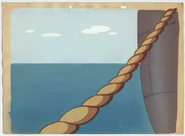Hobo Bobo is a 1947 Merrie Melodies short directed by Robert McKimson.
Plot[]
Bobo, a baby elephant, sees a dark future for himself if he should remain in India to haul logs with his trunk for the rest of his life. After receiving a letter from his uncle in America, he decides to emigrate there to play on a circus baseball team. After Bobo's attempts to stow away aboard a ship bound for the United States fail repeatedly, he is advised by the Minah Bird to paint himself pink. As seeing pink elephants is the traditional hallucination of the drunkard, neither the captain, the crew nor the passengers, will acknowledge seeing Bobo, and thus he has the virtual run of the ship for the entire voyage. When Bobo finally disembarks in New York City, he is likewise unacknowledged, until a street-cleaning vehicle washes his pink paint off, and the populace panics at the sight of a normal gray baby elephant on the street. Hauled into court by the police, the judge sentences him to life, at the circus, where he is promptly engaged by the baseball team as the official batboy, and he angrily says, "Batboy, shmatboy! I'm still carrying logs!"
Music Cues[]
- Star of India (by John Walter Bratton)
- Plays during the original opening credits and continues into the main action
- Frat (by John F. Barth)
- First plays when Bobo views Uncle Jumbo's postcards
- Sobre las olas [Over the Waves] (by Juventino Rosas)
- Plays when Bobo is on the tightrope
- Fingal's Cave Overture (by Felix Mendelssohn)
- Plays when the Minah Bird appears
- A Life on the Ocean Wave (by Henry Russell)
- Plays when Bobo tries to steer the ship
- Rocked in the Cradle of the Deep (by J.P. Knight)
- Plays when Bobo is leaning on a rail
- America (by Lowell Mason)
- Plays when Bobo reaches America
- A Little on the Lonely Side (by Richard Robertson, Frank Weldon and James Cavanaugh)
- Plays when Bobo walks through the custom house
- 42nd Street (by Harry Warren)
- Plays when Bobo walks and sits in a bed of flowers and when the people react to Bobo
- Frat (by John F. Barth)
- Plays again during the circus scene
Availability[]
The Golden Age of Looney Tunes, Volume 4, Side 4
Looney Tunes Collector's Choice: Volume 3 (restored with original titles)
Goofs[]
- A lady's high heels overlap with her feet.
- The cartoon was originally part of the Merrie Melodies series. However, the lobby cards erroneously calls it a Looney Tune; presumably it was originally planned to be part of that series, but was changed at the last minute (and the lobby cards were never withdrawn).
Notes[]
- This cartoon shares several similarities to Disney's animated feature film Dumbo (1941);
- Both star a grey baby elephant protagonist that is usually mute.
- Both at least involve a circus as the major location.
- Both have a scene which involves the idea of pink elephants as the hallucination of drunkenness, though in "Hobo Bobo", this pink elephant idea is rather used as a joke.
- Both main characters interact with little black birds who ultimately help resolve their conflict.
- This is the only cartoon from the Golden Age of American Animation featuring the Minah Bird from the Inki series that is not directed by Chuck Jones. This is also the Minah Bird's only appearance in a Robert McKimson-directed cartoon, and the only cartoon where he does not appear with Inki.
- This is the only cartoon where Bobo speaks; in "Gone Batty", Bobo does not speak at all.
- The "$64 question" is a reference to the "big prize" on the famous radio quiz show Take It or Leave It.
- This cartoon is one of the few past 1946 to not list any voice characterizations, as Blanc did not provide any voices and Blanc's contract explicitly only allowed him to be credited for voice characterizations.
- MeTV aired a previously unreleased restored print of the cartoon on Toon In With Me. Premiering on 11 January 2021, it is the first restored cartoon print to debut on the MeTV network, as well as the first such short for the block.
- This was Rod Scribner's last cartoon as an animator before he suffered a severe bout of tuberculosis. His name will not appear in the credits again until Strife with Father in 1950.
- The original titles present on Looney Tunes Collector's Choice: Volume 3 use the opening rings from "Hollywood Daffy" due to poor integrity of the print used.[3] This also has the inadvertent effect of the incorrect WB shield being used in the opening sequence; a similar gaffe also occurred with the restored print of "A Wild Hare".
- It is currently the only pre-1948 cartoon that was remastered with both its Blue Ribbon and original titles.
Gallery[]
References[]
















